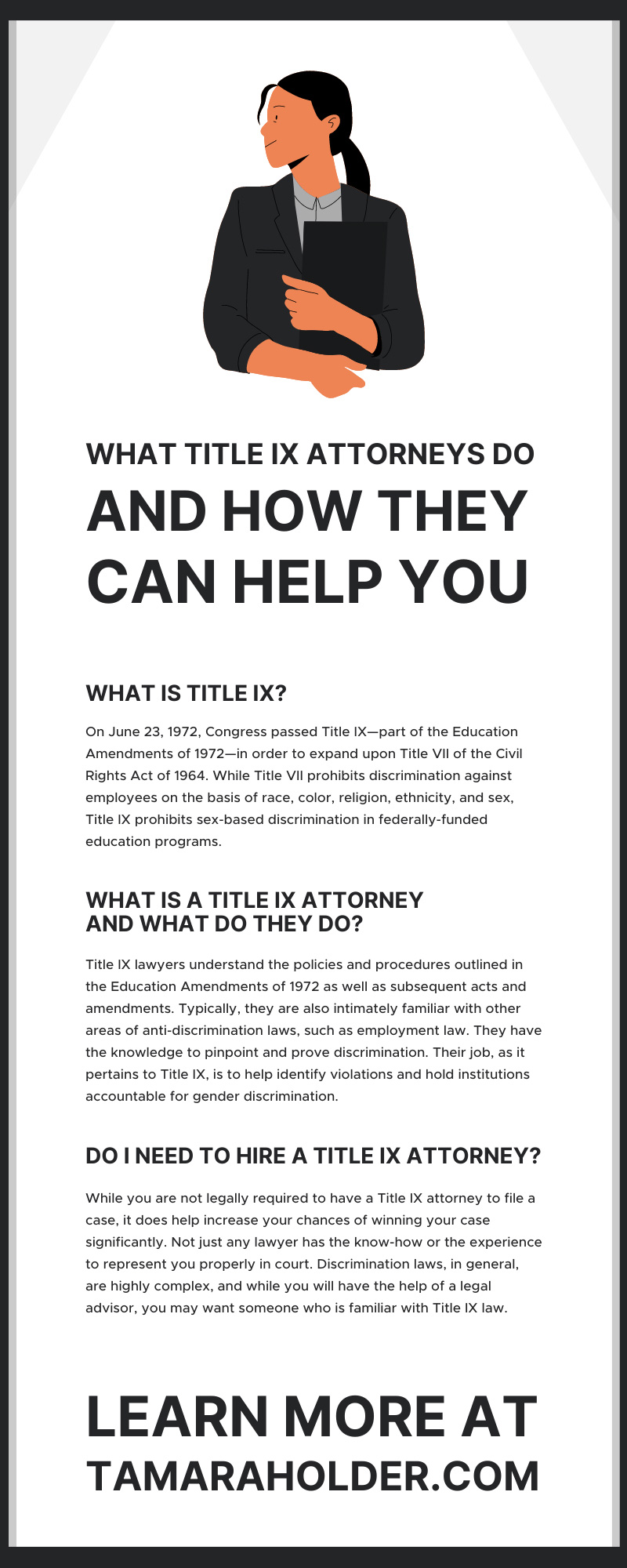Although many would like to believe we’ve progressed past sex discrimination as a society, there is still quite a lot of work that we need to do. Sex-based discrimination still occurs throughout many aspects of life, and although there are laws in place to help mitigate harm, they do not stop people from hurting others. In order to protect yourself from this kind of discrimination, it’s important to understand what Title IX is, what title IX attorneys do, and how they can help you.
On June 23, 1972, Congress passed Title IX—part of the Education Amendments of 1972—in order to expand upon Title VII of the Civil Rights Act of 1964. While Title VII prohibits discrimination against employees on the basis of race, color, religion, ethnicity, and sex, Title IX prohibits sex-based discrimination in federally-funded education programs. More specifically, no education program that receives funding from the government can exclude someone on the basis of sex in any aspect. Each person should have access to financial assistance, counseling, athletics, recruitment, and employment opportunities.
Sex-based description, also known as gender discrimination, is the unwanted or unfavorable treatment of a person based on their sex and is in direct violation of Title IX. However, what exactly does this kind of treatment look like, and how can we tell when someone is in violation of Title IX?
Gender discrimination, sexual harassment or violence, and retaliation on the basis of gender are all illegal acts, but they do not always fall under Title IX. In these individual cases, the legal onus falls on the alleged perpetrator, as schools simply cannot control everyone on campus. However, if students act in a discriminatory manner, it is up to the school to have clear policies and procedures regarding sex-based discrimination and to act accordingly. If a school lacks a way to report sex-based discrimination, does not have clearly defined procedures or consequences, or has discriminatory policies, they are in violation of Title IX.
Now that you have an idea of what Title IX is and what violations look like, you should learn more about what Title IX attorneys do. Title IX lawyers understand the policies and procedures outlined in the Education Amendments of 1972 as well as subsequent acts and amendments. Typically, they are also intimately familiar with other areas of anti-discrimination laws, such as employment law. They have the knowledge to pinpoint and prove discrimination. Their job, as it pertains to Title IX, is to help identify violations and hold institutions accountable for gender discrimination.
They deal with a variety of educational institutions, as Title IX applies to all public schools, not just universities. Most commonly, they deal with cases where schools refuse to or inadequately deal with sex-based discrimination. If a student is a victim of sexual assault, denied the option to join a program, subject to sexist policies, or harassed, a Title IX lawyer can handle the case.
While you are not legally required to have a Title IX attorney to file a case, it does help increase your chances of winning your case significantly. Not just any lawyer has the know-how or the experience to represent you properly in court. Discrimination laws, in general, are highly complex, and while you will have the help of a legal advisor, you may want someone who is familiar with Title IX law. They can help you gather documentation to support your case, prepare you for an interview with the Title IX investigator, and help you respond to evidence in court.
When searching for an attorney, you should always conduct an interview before hiring. Your first step is to ask them what their specific area of practice is. While they may tell you they’re a Title IX attorney, your next step is to ask how many Title IX cases they’ve handled. There’s no shame in being direct and honest in your interview. If your Title IX case is complex, you want a lawyer who understands the realities of these cases, not just theoretical arguments.
After you confirm they’re an expert in the necessary field, it’s time for the uncomfortable question—how many Title IX cases have they won? While it’s not necessary for them to have a 100 percent success rate, there’s no harm in knowing your odds. Ultimately, a Title IX lawyer should be honest and upfront about the odds of your case and thoroughly inform you of the investigative process. If a lawyer is generally vague about their pricing, area of practice, or case statistics, take these factors as red flags.
In order to file a Title IX complaint, you or your lawyer needs to contact the US Department of Education’s Office for Civil Rights. Before doing so, you first want to inquire as to the institution’s grievance procedures. However, if you’re at this point, they likely have none or have ignored your complaints.
Additionally, you must file a complaint within 180 days of the incident, and if you have not, you must request a waiver. If you request a waiver, you and or your lawyer prove that there was reasonable cause as to why you did not file the complaint earlier. Fortunately, filing a complaint is simple, and you can easily fill out an electronic complaint on the OCR’s website.
Now that you know a little bit more about Title IX and what Title IX attorneys do, let us know how we can help you. Here at the Law Firm of Tamara N. Holder, we dedicate ourselves to protecting the rights of women and LGBTQIA+ members. If you believe that a federally-funded education program has sexually discriminated against you, contact us today. We can put you in touch with one of our Title IX defense lawyers and provide you with the legal consult and representation you deserve.
